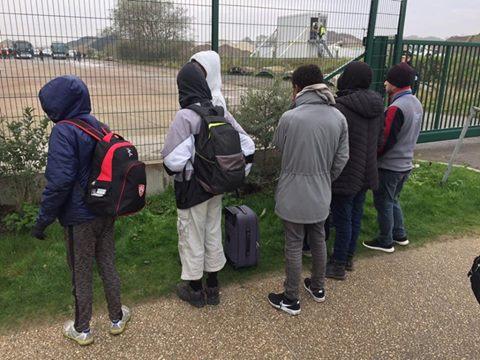Calais Jungle closed: First under-13s to arrive in Britain
Around 35 children aged 13 and below who have been qualified under the Dubs amendment are set to leave for Britain this afternoon

The first group of under-13s in the Calais Jungle who have been identified as eligible under the Alf Dubs amendment are set to leave for Britain on Tuesday.
Around 35 unaccompanied children aged 13 and below who do not have family ties in the UK were processed by the French authorities on Tuesday morning, and are currently waiting with packed bags on the fringe of the camp for a bus that will transport them away from the shantytown were they have been residing.
The news comes after the registration of unaccompanied minors was halted on Monday when a queue designated to children became overrun by other refugees and youngsters were left confused and fretting that they wouldn't get the chance to register.
Help refugees, a grassroots humanitarian response to the crisis in Calais, confirmed the registration of around 35 children eligible under the Dubs amendment - meaning they are unaccompanied but do not have links to the UK - had been completed and that the children would soon be leaving.
Josie Naughton, of volunteer aid group Help Refugees, told The Independent: "We are delighted to see the most vulnerable demographic - the under-13s and the girls - finally being brought to safety, and we hope to see as many unaccompanied children registered as possible.
"We now hope to see all unaccompanied children provided with appropriate accommodation and access to legal services so that they can finally begin their lives."
The Immigration Act amendment, proposed by Lord Dubs, who himself came to Britain as a child refugee from Nazi-occupied Czechoslovakia under the Kindertransport scheme, means the UK must accept vulnerable unaccompanied child refugees who do not have ties to the country.
Calais Refugee Children arrive in UK
Show all 9Over the weekend the first group of unaccompanied children arrived in the UK under the Dubs amendment, including many young girls. Previously all the young refugees who had arrived in Britain had been brought under the Dublin regulations, which require the children to have family resident in the UK.
Home Secretary Amber Rudd has said “several hundred” more children will arrive in Britain from the Jungle camp in the next three weeks. She told MPs earlier this week that they would be in addition to the 200 children who had already arrived.
The latest census by Help Refugees shows there are 49 unaccompanied children in the Jungle who are 13 years old or under, all of whom are eligible under the Dubs amendment for resettlement in the UK.
The census also found there are many unaccompanied girls remaining in camp who are eligible to come to the UK but were not registered over the weekend.
Meanwhile it has today been revealed that one in four local authorities in the UK - including Theresa May's constituency - has not agreed to take in unaccompanied minors arriving from the Jungle by taking part in the Government's voluntary National Transfer Scheme for minors.
The second day of the evacuation of the Jungle is said to so far be "fairly calm", although a scuffle reportedly broke out as unaccompanied minors were separated from the main queue for registration and taken to the front.
On Monday, 400 unaccompanied minors were registered in the camp and stayed in shipping containers, where they will be processed throughout the week. Conditions in the containers are said to be good, but Ms Naughton said there was a lack of adequate services.
She told The Independent: "Unaccompanied children were housed in the containers last night, which adult refugees left yesterday. But there is a problem in that there aren't nearly enough social workers to support them and assist the process."
Calais refugee camp evacuation
Show all 15Some 1,918 residents packed their bags and were taken by bus to 80 accommodation centres on the first day of the mass exodus, according to the French Interior Ministry.
Since the start of today sixteen buses have so far today picked up 656 migrants and set off to six different French regions, while 139 minors have been placed in the shipping container accomodation, according to a statement released by the Prefecture of Calais this morning.
The statement affirms that since the start of Monday, 3,113 of the camp's residents have been placed in alternative accomodation.
A further 85 buses are expected to arrive on Tuesday and Wednesday with officials saying the entire operation should be finished by the end of the week.
Subscribe to Independent Premium to bookmark this article
Want to bookmark your favourite articles and stories to read or reference later? Start your Independent Premium subscription today.

Join our commenting forum
Join thought-provoking conversations, follow other Independent readers and see their replies